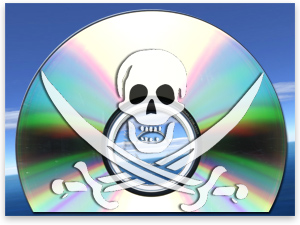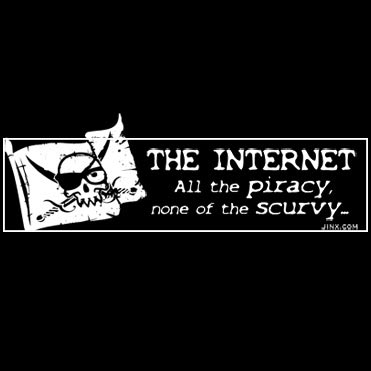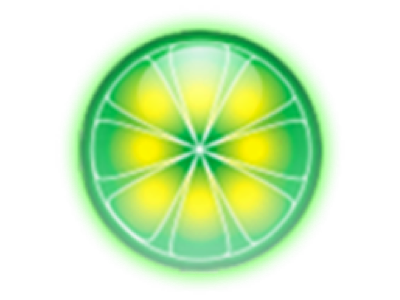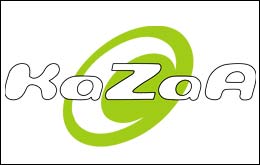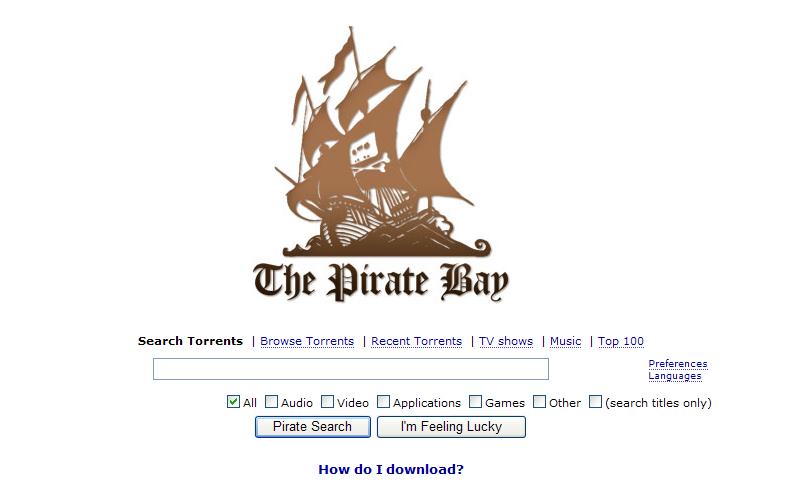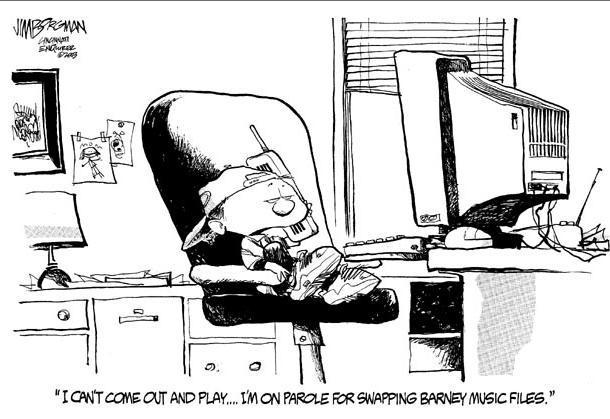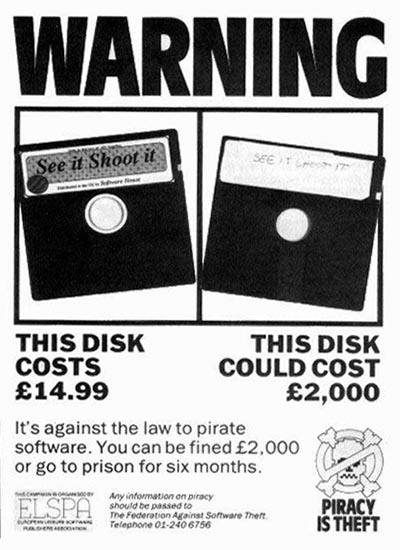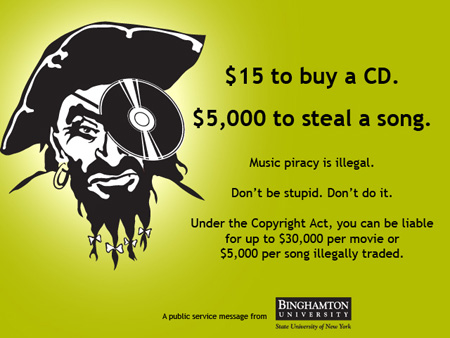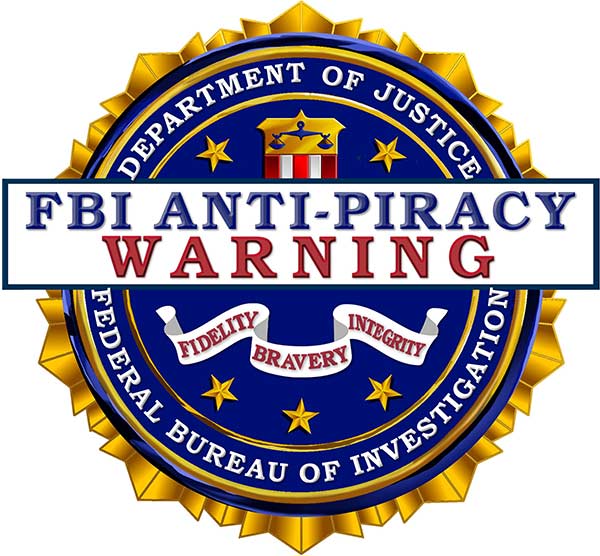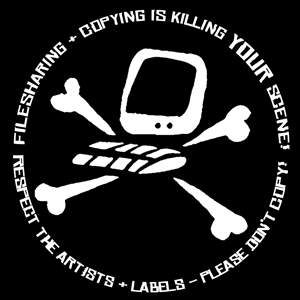F08 CPSC203 T08 GROUP 4
Contents
- 1 Piracy:
- 2 Group Members
- 3 Initial Project Statement:
- 4 What is Piracy?
- 5 How does Piracy Work?
- 6 What are the different types of Piracy?
- 7 Internet Piracy
- 8 Why do people Pirate?
- 9 Who is affected by piracy and how?
- 10 What are the Legal consequences of Piracy?
- 11 What are some other consequences of Piracy?
- 12 What is being done to prevent piracy?
- 13 Refrences
Piracy:
An issue that is very relevant to current issues of copyright infringment and internet security.
Group Members
-Matt Simmons
-Ashley Hougan
-Krista Gibson
Initial Project Statement:
We will be discussing the many issues associated with priacy. This will include an explanation of what exaclt piracy is. It will also cover things such as how piracy works, the different types of piracy , and who has access to pirated downloads. The different laws and consequences of piracy in North America will be examined, and we will look at what is being done to prevent piracy in todays society.
What is Piracy?
Piracy if the illegal copying, downloading, creation, and distribution of something one is not legally entitled to. This can include music, movies, games, software and videos, and even things such as novels, essays, magazines and... However, we will be covering the more technological based forms of piracy. Piracy is an issue that deals heavily in copyright infringement and the illegal distribution of intellectual property. There are so many options for acquiring an illegal copy of something that piracy has become a major issue.
There are many different definitions of piracy but no matter how it is put, it is evident that piracy is illegal and affects many people. Whether it is downloading something off the internet or just copying a CD for a friend, it is the same as committing the crime of stealing from a store.
How does Piracy Work?
There are several steps in the process of making pirated downloads accessible to the public. For access to pirated downloads over the internet there must be a physical copy of the CD, game, or DVD in the first place. That disk must then be loaded onto a computer and saved into a file which can be accessed later on. That file can then be shared among people on programs which promote piracy, which are listed below, or can be sent via something such as e-mail. To get a file into a program which allows sharing between many people is simple. Many of the programs can access the file without any actions by the user, and some need the file transferred in. Either way, the final product is files, such as music, movies, games, and software, are shared among many people.
Another way that piracy works is the copying of a disk. This can be done by copying a disk onto a computer. Certain programs are made to copy disks onto a computer and then can put those same songs onto a new disk for another someone to sell, or for another person to use. Some programs which are made to do these operations are iTunes, some adobe products, and some windows products.
With all the different ways which people can get access to pirated copies, piracy is becoming a bigger issue than ever, and the industry is having to come up with new ways to try and prevent piracy.
What are the different types of Piracy?
Counterfeiting:
Counterfeiting is the illegal duplication, distribution and/or sale of copyrighted material intending on imitating the copyrighted product. Counterfeited copies often include related packaging, manuals, license agreements, labels, and fake registration cards and security features. Many people unwillingly or unknowingly buy counterfeighted materials for discounted prices from the internet or from businesses such as pawn shops. Realistically if the price seems to good to be true it probably is, even if the packaging looks real it doesnt mean it is. To avoid this you should purchase your software/media from legitimate well known companies.
End-user Piracy:
End user piracy occurs when a person reproduces copies of software without authorization. This includes all of the following;
• Using one licensed copy and installing it on multiple computers
• Copying discs for installation or distribution
• Acquiring academic or other restricted or non-retail software without a proper license
Client-Server Overuse:
This occurs when too many users on a network are using a central copy of a program. For example, if you have a local-area network and install programs on the server for several people or computers, you must be sure that your license permits you to do so. If you have more users than is allowed by your license, that's considered "overuse".
Hard-Disk Loading:
This occurs when a business sells new computers with illegal copies of software pre-loaded onto the hard disks. This is done in order to make the purchase of the new computers more attractive to customers.
Internet Piracy:
See below
Internet Piracy
This occurs when media or software is downloaded from the Internet.
The Unauthorized use of media or software on the internet is a significant issue which has implications throughout the world. Millions of unauthorized copies of media are available for download online, such as music files like MP3's, which allows downloading and thus further unauthorized copying. Sites that facilitate peer to peer (P2P) file-sharing have continued to grow and thrive on the internet, resulting in hundreds of millions of dollars in lost revenues to artists and rights holders.
Here are some interesting statistics about Internet piracy. These results are from the International Federation of Phonographic Industries 2006 Piracy Report:
- In 2005, Internet users illegally exchanged and/or downloaded about 20 billion tracks of music, adding up to about $24.3 billion in lost revenue for the music industry.
- That same year, pirated CDs cost the music industry about $4.5 billion in lost sales.
What are some examples of websites/ programs used for piracy?
These are some of the most commonly used programs for internet downloading. These sites not only offer music, but you can also find videos/ movies, games, and software.
• Newsgroups (Usenet)
Who has access to pirated downloads?
Everyone! Pretty much anyone with a computer can gain access to pirated downloads. With so many websites that allow piracy to continue, with an internet connection and one of those programs which continue with the sharing of music, it is very easy for anyone to gain access to those types of pirated copies. Also with the continuing copying and sharing or selling disks, there are many ways which people cay n gain access to those as well. A friend could give you a copy, or someone on the street could be selling them. Either way, it is clear that acquiring a pirated copy is quite simple.
Why do people Pirate?
It is common knowledge that Piracy is illegal. It is considered, by law, to be equivalent to stealing the real thing. For instance downloading the new Indiana Jones movie from a pirated site or collecting it from another illegal distrubuter is the equivalent of stealing the DVD right off the shelf of your nearest music store. And yet the majority of people that pirate would never risk stealing a DVD from a store. So what exactly makes it okay to steal a pirated movie off a site like Bearshare or Limewire and not okay to steal a DVD from a store shelf?
The answer is simple. People pirate because it’s easy. Piracy is accessible to anyone who has a general knowledge of how computers and the internet work. Simply put anyone who has the ability to search “Free Music Downloads” into a web search such as Google or Yahoo can theoretically create an account on any piracy site and then download free music onto a computer. Same goes for downloading movies, software, and other such forms of Intellectual property. Piracy is also obviously cheaper than buying the real thing. But this reason expands to how expensive the real thing actually is. Many people that pirate simply because they cannot find it within themselves to buy a DVD for $20 and up, or software, such as Photoshop or Microsoft Office, for $100 or more. It is not a only question of Piracy being free that makes it such an appealing feature but instead a question of how much would people be willing to pay for the real thing before it became too expensive in which they felt they needed to turn to a crime such as piracy.
Another reason people pirate because they can detach themselves from the crime in several ways. First off the act of logging into a site on a false name and downloading a pirated version of a movie is not as personal as actually walking into a store and taking a DVD right under the view of a security camera. This detachment creates both the illusion that piracy is not as dishonest a crime as physically stealing a DVD and the illusion that there is less chance of actually getting caught.
Another way people avoid the guilt of committing the crime of piracy is though feelings of detachment of responsibility. People who pirate can often find it within themselves to justify their actions using the logic that they are ONLY the user of the site and, therefore they are not responsible because as the user they cannot be held accountable for their actions, they are innocent the site is not. This is of course not a realistic or legally justifiable to be any excuse for committing such a crime. Another detachment people make between the act of commiting the crime of piracy is the common justification that everyone pirates, meaning that to the vast majority of youth in todays society it has become a socaily acceptable norm for somone to pirate say music off a program such as Bearshare. The logic behind this norm follows the idea if its okay for him to pirate then it must be okay for me to pirate. Of course this logic is flawed- It is never okay for anyone to pirate. It is strictly illegal to distrubute or download versions of intellectual property without rights to the product.
Who is affected by piracy and how?
Everyone is affected by piracy. The Producer, the consumer. Those who choose to Pirate and even those who choose not to Pirate.
The artists, the people who invests in the Software, the producers of the product, and everyone associated with the legal distribution of the product are affected in a negative way from the act of piracy. Those who are associated with creating the product are not benefiting fairly from their work. It is simply not fair that all their hard work and money that it took to make a movie that cost millions of dollars to produce or all the time and hard effort it took to create the latest version of a computer software can be accessed for free in a matter of seconds by someone who has not paid for rights to the product in the first place by means of a piracy site.
Furthermore the illegal distribution of such a product can create a loss of incentive to create a new and improved product in the future because the profit from their work will be reduced because of people not paying for their product. Secondly the concept of supply and demand is affected by the illegal distribution of Intellectual Property. When illegal free products enter the market it affects the supply of the product itself. This affects the supply curve for the product and forces the legal distributer to increase the price to make up for the number of people who access the product for free by means of piracy. Thus this increase of price affects those consumers who choose to buy the product legally as they are forced to pay more due to the illegal actions of others.
This increase in price for the legal product leads to a inflated problem. The increase in price will cause more incentive for people to pirate. An increase in the number of people who pirate will decrease the legal profit made from the product and thus the producers will once again be forced to raise the price due to the loss of profit.
Lets look at some of the losses incured from piracy.
The Motion Picture Association of America recently conducted a study about the losses incured by piracy. According to the study, MPAA studios lost $6.1 billion to piracy in 2005.
The study states that $1.3 billion of the losses came from piracy in the United States and $4.8 billion internationally, with almost half of that loss occurring in Europe. About $2.4 billion was lost to bootlegging, $1.4 billion to illegal copying and $2.3 billion to Internet piracy. In the United States, illegal copying and distribution is more of a problem while through most of the rest of the world, illegal downloading and bootlegging is more prevalent.
What are the Legal consequences of Piracy?
Simply put, piracy is stealing. Though the laws and penalties differ from country to country and even state to state, most countries have anti piracy laws.
United States
In the United States if you are caught copying and/or distributing illegal copies of copyrighted material, you could be held liable under both civil and criminal laws. If the original owner or copyright holder decides to sue you, they owner can seek to stop you from using and distributing its product immediately and may also request monetary damages. The legal owner may then choose between actual damages incured, which includes the amount it has lost because of your infringement along with any of your profits attained through the infringement, and statutory damages, which can be up to millions of dollars. In addition, copright infringement is considered a criminal offence, and the government can criminally prosecute infringers with fines up to $250,000, and/or sentenced to prison for up to five years.
Copyright law in the United States is a part of federal law, and it is authorized by the U.S. Constitution.
The power to enact copyright law is granted in Article I, Section 8, Clause 8, also known as the Copyright Clause, which states: "The Congress shall have Power [. . .] To promote the Progress of Science and useful Arts, by securing for limited Times to Authors and Inventors the exclusive Right to their respective Writings and Discoveries. "
There are also laws against recording movies in theaters in the united states. This can be cited as the ``Family Entertainment and Copyright Act of 2005.
"Any person who, without the authorization of the
copyright owner, knowingly uses or attempts to use an audiovisual
recording device to transmit or make a copy of a motion picture or other
audiovisual work protected under title 17, or any part thereof, from a
performance of such work in a motion picture exhibition facility,
shall
- (1) be imprisoned for not more than 3 years, fined under this title, or both; or
- (2) if the offense is a second or subsequent offense, be imprisoned for no more than 6 years, fined under this title, or both."
Canada
Canadian Piracy policy is somewhat similar to the United States.
Under the Canadian Copyright Act, the maximum penalties for unauthorized manufacturing, importation or distribution of copyrighted products are a $1 million fine and five years in prison.
Canada was the talk of much controversy throughout the world and was blacklisted by movie and music companies due to the high amounts of piracy prior to 2007. Much of the blame is due to very weak laws regarding piracy. For example prior to June 2007 it was not illegal in Canada to record a movie in a theatre. Authorities needed to prove that a cam movie recording was intended for sale or distribution in order to press charges.
However Bill was C-59 imposed in June 2007. The bill addressed the illegal recording of movies in theatres. To this end, it creates two offences in the Criminal Code:
- recording for personal use of a movie shown in a theatre – liable to imprisonment for not more than two years; and
- recording for commercial purposes of a movie shown in a theatre – liable to imprisonment for not more than five years.
What are some other consequences of Piracy?
Risks to Computer Security
The consiquences of piracy expands past the rights to distribute and a breach of the market, it also affects the computer security of those who download from pirating sites. Viriuses and Spyware can be spread through dowloading of products from illegitamate sources. This could infect your computers files, and compromise any confidential information stored in your computer or even typed on your keyboard.
Another thing to consider, is when somebody is offering to sell you something of which they have no right to sell, you have to wonder what they’re going to do with your personal and financial information.
In the case of unknowingly buying pirated material, phishing scams may be used. Phishing is the illegal practice of tricking consumers into providing personal information which can then be used for identity theft or other illegal activities.
What is being done to prevent piracy?
There are many Anti-Piracy laws in place in many countries around the world. While the actual laws and punishments vary from country to country and even state to state, it is clear that throughout the globe anti-piracy and copyright laws are being changed or imposed as a way to create harsher punishments, and to protect copyright holders rights.
These laws and penalties have seen many people jailed or fined, as well as some internet sites shut down. Recently Nineteen defendants from across the United States and other countries who were alleged leaders, members or associates of the underground software piracy group known as “RISCISO” were indicted on federal charges for pirating more than $6.5 million of copyrighted material including; computer software, games, and movies. This underground organization operated through non-public Internet sites. Some Sites have been permanently shut down by the Federal Bureau of Investigation and The Department of Justice. These include;
- napster
- Because of pressure from the law enforcement and countless court battles, a widely used torrent website called torrentspy decided on their own, not due to any court order or agreement, to bring the Torrentspy.com search engine to an end and thus permanently closed down worldwide on March 24, 2008.
In addition to these harsh penalties, Several organizations such as the BSA (Business Software alliance), and the ESA (entertainment software association) are lobbying for harder laws against piracy, and are trying to increase awareness. These organizations are acting as industry watchdogs in order to identify and prosecute offenders, create legislation to protect manufacturers, provide help in identifying unlicensed software, and provide information to help organizations stay compliant with federal and regional laws.
The Business Software Alliance is a global organization which was formed in order to advance free world trade for legitimate software by pushing for strong intellectual property protection rights. The BSA was Established in 1988, and represents leading software developers in 65 countries throughout the world.
The Software & Information Industry Association is the principal trade association for the software and digital content industry. The SIIA provides services around the world in business development, corporate education, government relations and copyright protection to the leading companies whom are setting the pace for the digital age.
In 2004 UNESCO (United Nations educational, scientific and cultural organization) developed and launched the APTT project (Anti-Piracy Training for Trainers), which consisted of a series of regional and sub-regional courses for copyright law enforcement officials. The immediate objective is to provide both knowledge and expertise in the field of copyright law and piracy, while the long term objective of the APTT project is to contribute to the reduction of intellectual piracy rates. The first stage of the project, is aimed at the participants of the course, while the second stage is intended to a much larger circle of national authorities which are involved in anti-piracy activities including the government, police and law makers.
Private organizations are also developing ways to stop internet piracy. One example of such is PAN’s DIF (Digital Interactive Fingerprinting) [1] .
According to PAN's website, "The PAN Network has recently introduced a new system for the detection, deterrence, and prevention of online music (and video) piracy. The core technology is called DIF, which is PAN's patent-pending method of Digital Interactive Fingerprinting for the Detection and Prevention of Online Music and Video Piracy."
....the fingerprint "provides the means to trace the identity of any person who downloads a copyrighted file which subsequently appears on an unauthorized website."
Refrences
• Wikipedia:Pirate. (November 8 2008). http://en.wikipedia.org/wiki/Pirate
• Piracy is a Crime. (November 10 2008). http://www.piracyisacrime.org/
• Time Magazine: . (November 10 2008 ) . http://www.time.com/time/magazine/article/0,9171,1625209,00.html
• Info Web Links: Copyright Piracy. (November 8 2008). http://www.infoweblinks.com/content/copyright-piracy.htm
• GameSpy:Software Piracy Report. (November 10 2008). http://archive.gamespy.com/legacy/articles/piracy.shtm
• Microsoft: Piracy. (November 11 2008). http://www.microsoft.com/piracy/
• SIAA. (November 26 2008) Anti-Piracy. http://www.siia.net/piracy/whatis.asp
• Directgov. (November 26 2008) http://www.direct.gov.uk/en/YoungPeople/CrimeAndJustice/TypesOfCrime/DG_10027978
• Kids Pages (November 29 2008) http://www.uspto.gov/go/kids/kidantipiracy04.htm
• IFPI (December 3 2008) http://www.ifpi.org/content/section_views/what_is_piracy.html
• Microsoft (December 3 2008)http://www.microsoft.com/uk/licensing/homeuser/what-is-piracy.mspx
• IPIntegrity (December 3 2008) http://www.iptegrity.com/index.php?option=com_content&task=view&id=110&Itemid=9 i
• Hellenic Copyright Organization (December 3 2008) http://web.opi.gr/portal/page/portal/opi/info.html/faqs.html/faq08.html
• Stop Movie Piracy(December 3 2008) http://www.stopmoviepiracy.co.nz/piracy.html
• IMI (November 28 2008) http://www.indianmi.org/whatispiracy.htm
• Don’t Buy CD’s (November 28 2009) http://www.dontbuycds.org/piracy.htm
Matt's References
Vito Pilieci, CanWest News Service, movie piracy from Canada (November 25, 2008) http://www.canada.com/globaltv/national/story.html?id=b3dea202-82da-4ad9-b6f8-277923bc1f6b
CRIA anti piracy(November 21,2008) http://www.cria.ca/antipiracy.php
Corel,Piracy Report(November 25,2008)http://www.corel.com/servlet/Satellite/us/en/Content/1152796558890
Articopa, piracy and law enforcement(November 25,2008)http://www.articopia.com/legal/media-piracy-and-law-enforcement.html
Symantec, piracy consequences(November 25,2008)http://www.symantec.com/about/profile/antipiracy/consequences.jsp
Symantec, types of piracy(November 25,2008)http://www.symantec.com/about/profile/antipiracy/types.jsp
UNESCO, Prevention of piracy through training (November 25,2008)http://portal.unesco.org/culture/en/ev.php-URL_ID=30715&URL_DO=DO_TOPIC&URL_SECTION=201.html
Adobe, Piracy FAQ(November 26,2008)http://www.adobe.com/aboutadobe/antipiracy/piracy_faq.html#copyright
PAN, solution to internet piracy(November 26,2008)http://www.pan.com/piracy/
Solidworks,Piracy prevention(November 26,2008)http://www.solidworks.com/sw/piracyprevention.htm
Associated Press, piracy losses growing(November 28,2008)http://www.msnbc.msn.com/id/18676887/
Adobe,Antipircay(November 28,2008)http://www.adobe.com/aboutadobe/antipiracy/
Blank off, Internet Piracy(December 3, 2008)http://www.blank-off.com/articles/knock-off/counterfeit-media.php
Canadian Parliament, bill C-59(December4, 2008)http://www.parl.gc.ca/common/bills_ls.asp?lang=E&ls=c59&source=library_prb&Parl=39&Ses=1
Copyright.gov,FAMILY ENTERTAINMENT AND COPYRIGHT ACT OF 2005 (December 4, 2008)http://www.copyright.gov/legislation/pl109-9.html
Adobe, Piracy news (Dec 5, 2008)http://www.adobe.com/aboutadobe/antipiracy/news.html
Spam daily news, MPAA piracy loss data (December 5, 2008)http://www.spamdailynews.com/publish/MPAA_releases_new_piracy_loss_data.asp
